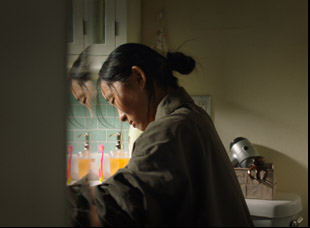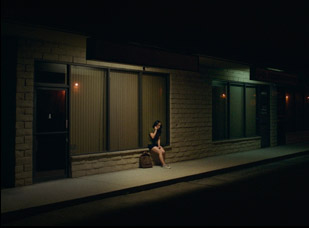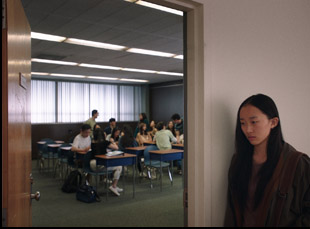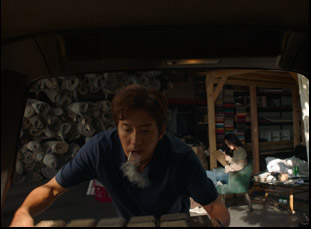Hayoung (Ji-young Yoo) spends a lot of time looking out onto the world, unable to really be a part of it as she stares out of windows of homes that aren’t hers in So Young Shelly Yo’s beguiling debut “Smoking Tigers.” Not quite able to operate independently just yet at 16, she has to accompany her father (Jeong Jun-ho) to one Southern California residence to another as a carpet salesman when her mother (Abin Andrews) can’t watch her while she’s at her job and when it appears that the two are on the verge of a separation, she can feel like a stranger inside her own house. It isn’t that the Miracle Learning Academy is all that welcoming a place when Hayoung ends up finding refuge there, sent to raise her SAT scores if she wants to put herself on the path to leaving this unhealthy atmosphere once and for all, but an afterschool program designed to strictly teach for the test seems as good a place as any for the teen to be if she’s around others who’d rather be anywhere else too.
However, Yo makes a drama that one wants to settle into and get lost in, making fine use of a city where every door can promise a mystery behind it and Hayoung has to question herself, not only at the age she’s at but realizing that her parents in the process of pulling away from one another aren’t who she might’ve thought they were, either. The film was produced as part of Tribeca’s Untold Stories program that awards $1 million to a promising project with the catch that it has to be delivered a year later for a premiere at the New York festival, a short timeline for a stem-to-stern undertaking, but clearly made possible here by the depth of feeling that the director brings to it, capturing an energy around the time and place in Hayong’s life that can feel like a free-floating anxiety or excitement depending on the company she keeps. Stanford may not be in the cards based on what she learns at the Academy, but as she believes she’s found a few friends in Rose (Erin Yoo) and Joon Park (Phinehas Yoon) and explores a social scene she hasn’t yet been a part of, an entirely different kind of education takes root when she’s not under her parents’ thumb.
Although finding her way may not be easy, there’s a grace that Yo sees in each step Hayoung takes and captures the nuance in all the formative experiences she has in navigating complicated interpersonal dynamics in school and at home. Now the film itself is preparing for a life of its own, first having an exclusive theatrical run in its hometown at the Laemmle Glendale before a wider release on Max next week and recently Yo graciously took the time to talk about the personal history she could draw on to give “Smoking Tigers” such vivid detail, the evolution of the film’s distinctive visual style and connecting with audiences far removed geographically but not emotionally from where the film is set.

Yeah, my sister and I spent most of our time going to these afterschool [programs] because my mom is a single parent, so it was educational, but also like babysitting for me. It was also there where my love for film started. I think I was always interested, but when I was going to these SAT boot camps, all my teachers were aspiring filmmakers, so when they weren’t teaching us vocabulary words, they were showing us films by Spike Jonze and Michel Gondry, so that’s when I started to see things that were outside of my norm and I thought, “Okay, maybe this is something I’m interested in doing as a career.
I’m so excited to hear that somebody could get some kind of education in those places, because generally it’s all so geared towards the test.
Exactly. I feel like I got so much film education from there, but also just life because my mom didn’t really know what it meant to grow up in America, so a lot of my [education] came from my friends from that school and it was great in many ways, but also painful.
One of the really inspired ideas the film is this idea of the father as a carpet salesman because he has to visit all of these homes around the city, bringing his daughter along with him. Was that foundational to this?
The whole film isn’t based on truth, but there are sprinkles of truth and my dad was actually a carpet salesman. He didn’t go door to door, but because he owned a small office, I would see different people coming in and witness the different types of Korean Americans out there. That’s where I got a little taste of the world and the different immigrant families. I wanted to extract that, but have him be a wandering carpet salesman, so we could experience different locations and different houses and that’s when the main character, Hayoung, would start comparing herself to the others.
It was. There’s so many beautiful houses in California, you really see such a myriad of different types of designs, but I feel like it was really challenging, too, because to find the right elements, you have to look all around Southern California. Even though it largely takes place in Koreatown the suburbs of [Los Angeles], we shot in Pomona and Thousand Oaks.
I was visiting a lot of the locations on site with my cinematographer, and from there we built the vocabulary of the film. By sitting there and thinking about how the characters would move in the space, we started figuring out that there’s a theme of reflections going on — and later even in the edit, we uncovered it even more — where she’s never quite seeing herself in the reflection [she sees in the windows of these houses]. She’s always seeing somebody else. And [the barrier to the outside world seems] so transparent. It feels within reach. But there’s a barrier that’s keeping her from her fantasy. So we really wanted to push that forth until in the end, like, the person that she sees in the reflection is somebody from her own family. That was one of the most exciting parts of discovering this language for the film.
You pull off a really wonderful shot in a spa where you’re able to look at Hayoung, her mother and her younger sister all in one shot in different mirrors that are disconnected from one another. Was that tricky to stage?
That was just a location thing. No tricks there. Initially in one of the versions of the script, we had a church and a sauna, but because of our budget constraints, we were like, “Okay, which one should we pick?” And we ended up choosing the sauna because it’s such a beautiful space that represents the Korean culture, but also resembles the journey of our main character. She’s somebody who’s ashamed to show her true side and be vulnerable, and in the end she comes to be much more vulnerable with her loved ones. And when we’re scouting, all the saunas were like, “No, no, no, no,” except this sauna. It ended up being such a magical experience because it has very cinematic locations within the sauna. For example, the locker room with the pillars [with the mirrors on them], even if we wanted to create that, it wouldn’t come out as good as having it be from the natural location.

I had briefly met Ji-Young many, many years ago when I was casting for a short film, which was the proof of concept for “Smoking Tigers,” and at that time, we ended up going with people who were actual teens. But I always kept her in my mind because I felt like she was so special and I was watching her journey. I knew she was in a play called “Man of God” that I went to go see, and she just completely blew me away. I remember I wasn’t even that close to the stage, but I remember seeing a twinkle in her eye that felt so real and so genuine, so when it was time for casting, I was like, “Ji-Young has what it takes to sustain our attention for that amount of time.” She was so captivating and magnetic that I knew she was someone special that we wanted for our lead. Luckily, she signed on, and it’s been a great collaboration with her.
Because the family dynamics are so good, I imagine that a lot of it was in the script, but when you actually get all the actors together, were there things that you could get excited about?
We didn’t have that much rehearsal, but we had moments where we sat down with the key actors and went through the entire script together and we tweaked each dialogue to each actual person and we started getting into the details of each character in that way. For example, the dad, we started to play with his language. In the beginning, it was all in Korean. But then once we started talking, [Jeong Jun-ho, the actor playing him] was like, “I find that a lot of kyeopo”— which is Korean-American fathers or parents — “they speak a mix of English and Korean,” so he [said], “It would be funny if a lot of his English came from movies.” So we started sprinkling in iconic movie sayings like “I’ll be back” from “Terminator,” something like that, to show how he came upon his language. And same with Ji-Young. We discovered that Hayoung is a character that uses language as a weapon, so when she doesn’t want to be understood, she’ll speak in English, creating a barrier between her and her parents. That was one of the most fun parts, creating specific character beats with each actor.

You could plan and shotlist all you want, but until you go on location and you actually lay the camera, you don’t know if it’s going to work or not. Obviously, the DP and I did a lot of work trying to craft it, but sometimes I think she established a shot that we felt like was strong enough that we didn’t need any coverage. It felt like a bold choice, but we felt we wanted it to be that kind of film where we’re not doing so much coverage and breaking up the energy. We’re just really sustaining in a time and in a moment, so those were the most exciting parts.
Stripping away to the bare essentials seems to be a really important part of this and I’ve heard you’re a Bresson fan. What was it like getting this back to the edit?
Ozu as well, but it’s funny you mentioned Bresson, because for the cheating scenes, a lot of the image references were shots from “Pickpocket.” I really wanted to focus on the hands as much as possible. Some people on the team were confused, like, “Why are there so many shots of hands? But I think there’s so much you can tell from hands, and I remember in one of the scenes, we had a stand-in act as the father’s hand, and then it wasn’t working. Because hand acting is still acting, so you still need somebody who channels that energy of the character, even through the hands. It’s so important.
What’s it been like getting this out into the world so far?
It’s been great. I’ve been able to travel with it all over the U.S. and also around the world, and I feel like with each trip, there’s a few people that come up to me and really share how much it connected with them. Those moments make it really worthwhile. I remember after one screening, somebody e-mailed me a really long letter about how much it connected with her because she had a developmental disability. She felt like she was really portrayed in the character of Hayoung and felt safe in the calm pacing of the film. Reading that brought tears to my eyes and really made me want to continue doing this because I was like, I felt in that moment, I myself felt very understood to know that somebody else felt seen.
“Smoking Tigers” opens on August 16th in Los Angeles at the Laemmle Glendale. It will stream on Max starting on August 23rd.





